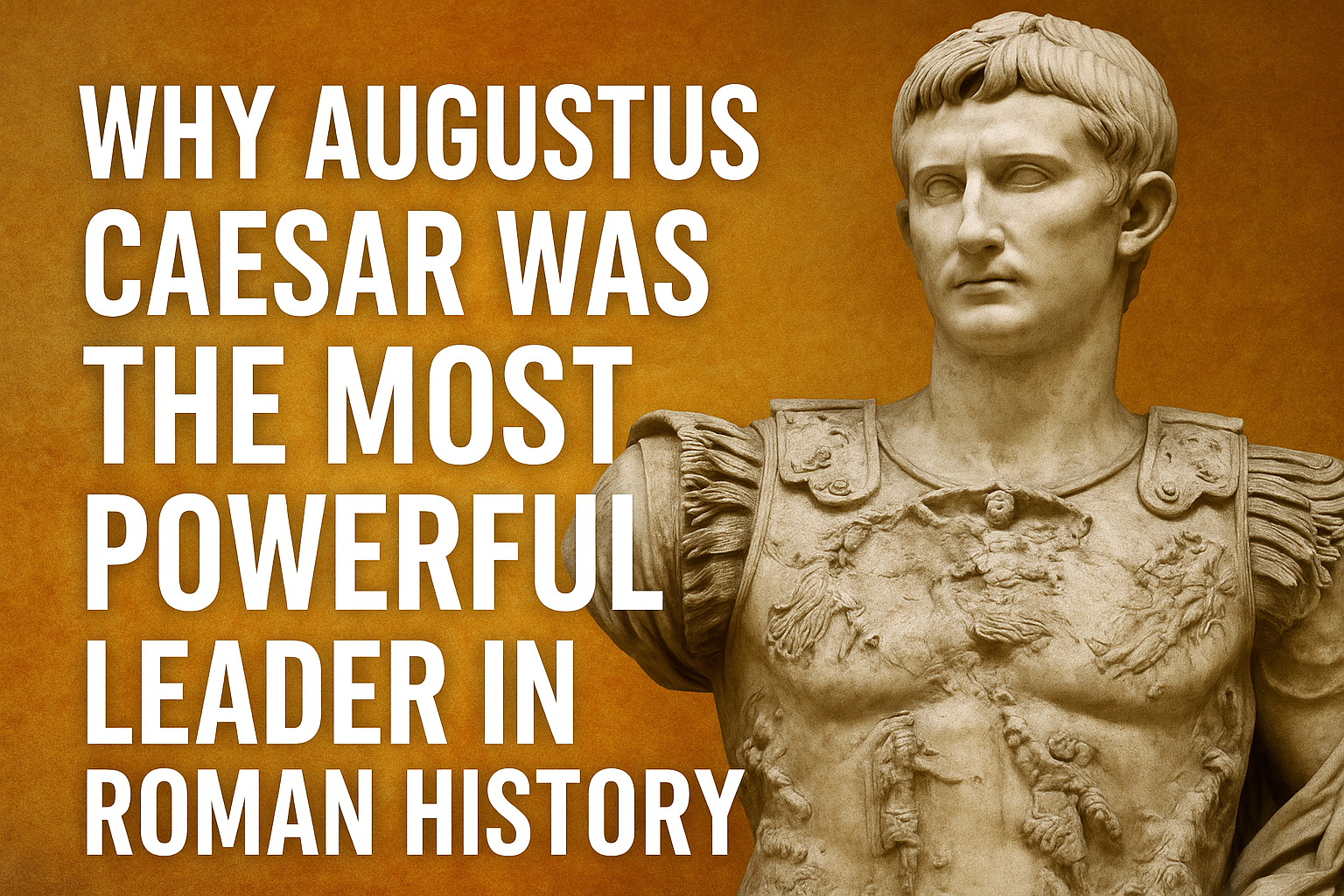Discover how Augustus Caesar rose from chaos to become Rome’s first emperor and forever shaped the course of Western civilization.
The Early Life Of A Young Patrician
Before he was known as Augustus, the boy who would change Rome forever was born Gaius Octavius Thurinus in 63 BCE. His lineage was distinguished—his great-uncle was none other than Julius Caesar himself, and his mother, Atia, came from a respected family of the Roman nobility. Yet despite this pedigree, few could have predicted that Octavius would become the cornerstone of a new Roman era.
Octavius grew up in a world of political intrigue, civil unrest, and the fragile remnants of the Roman Republic. When he was just a teenager, Julius Caesar adopted him as his heir—a decision that would transform the trajectory of his life. At only 18, Octavian, as he was then called, found himself thrown into the heart of a deadly power struggle that would redefine Rome’s future.
The death of Caesar in 44 BCE left Rome in turmoil. Civil war seemed inevitable, and various factions vied for dominance. Against seasoned generals and cunning politicians, Octavian had to prove he wasn’t just a symbolic heir but a leader in his own right. And he did just that.
From Heir To Architect Of Power
Octavian’s first challenge was legitimacy. Despite being young and relatively untested in war, he commanded the loyalty of many of Caesar’s veterans and possessed shrewd political instincts. By forging strategic alliances—including with Mark Antony and Lepidus in what became known as the Second Triumvirate—Octavian neutralized his enemies and took control of Caesar’s legacy.
However, the alliance with Antony was always fragile. As Antony grew closer to Cleopatra in Egypt and appeared to prioritize her interests over Rome’s, public opinion began to sour. Octavian capitalized on this, carefully crafting a narrative in which he alone stood for traditional Roman values. By the time the final battle at Actium was fought in 31 BCE, Octavian had positioned himself as Rome’s savior.
The defeat of Antony and Cleopatra was decisive. Octavian was now the undisputed ruler of Rome. But instead of crowning himself king—a move that would have surely incited rebellion—he presented himself as the “first citizen” or princeps. In 27 BCE, the Senate formally granted him the title Augustus, marking the beginning of the Roman Empire.
Reshaping The Roman World
Augustus understood that power is most effective when it’s subtle. Though he held absolute control, he maintained the façade of republican institutions. The Senate continued to meet, laws were passed through traditional channels, and old titles remained. Yet behind this elegant illusion, Augustus was the ultimate authority.
His reforms were sweeping. The military was reorganized into a professional standing army loyal to the emperor rather than to individual generals. The provinces were better administered, curbing the corruption that had plagued the Republic. Infrastructure flourished—roads, aqueducts, temples, and public spaces were built or restored, showcasing a renewed Rome both physically and spiritually.
One of his most significant achievements was establishing the Pax Romana, or Roman Peace. This period of relative stability and prosperity lasted for over two centuries, allowing commerce, culture, and communication to flourish across the vast Roman world. Augustus’ governance turned a fragile Republic into a robust Empire that could endure internal and external pressures alike.
The Master Of Propaganda And Public Image
Augustus wasn’t just a political and military strategist—he was also a genius of image-making. Realizing the importance of public perception, he commissioned statues, coins, and literature that portrayed him as a benevolent leader, a restorer of Roman virtue, and even a living god.
The poet Virgil wrote the Aeneid under his patronage—a national epic that connected Augustus’ lineage to Aeneas, the mythical founder of Rome. This linkage not only gave Augustus divine ancestry but also tied his rule to the destiny of Rome itself.
Sculptures often depicted him as eternally youthful and stoic, in contrast to the often brutal and chaotic realities of Roman politics. His architecture projects, such as the Ara Pacis (Altar of Peace), further underscored his role as the bringer of harmony and prosperity.
These calculated portrayals weren’t just vanity—they were tools of governance. Augustus knew that a stable and idealized image of leadership helped maintain order. The Roman people didn’t just obey him; many admired and revered him.
Family, Succession, And Personal Struggles
While Augustus may have conquered external enemies and political rivals, his personal life was far from peaceful. His marriage to Livia Drusilla was politically beneficial but produced no male heirs. His attempts to secure a successor from within his family were fraught with tragedy and scandal.
He adopted several potential heirs, including his grandsons Gaius and Lucius, only to see them die young. His stepson Tiberius, a capable but unpopular figure, ultimately became his successor. Though Augustus never seemed fully satisfied with Tiberius, he had little choice in the end.
His daughter Julia also caused him considerable distress. Despite strategic marriages to secure alliances, her scandalous behavior eventually led Augustus to exile her, an act that shocked many Romans and underscored his willingness to put the state above personal feelings.
These familial disappointments humanize Augustus. Despite his godlike status in propaganda, he faced the same unpredictability and pain that mark all human lives. They also hint at the cracks in the imperial system he built—cracks that would eventually widen in the centuries to come.
A Legacy That Changed The World
Augustus Caesar died in 14 CE at the age of 75, having ruled for over four decades. His death marked the end of an era but also the beginning of a dynasty that would rule for generations. The Roman Empire he founded endured in some form for more than a millennium, influencing law, language, architecture, and governance across Europe and beyond.
The month of August is named after him—a tribute to his enduring influence. But his true legacy lies not in names or monuments, but in the very fabric of Western civilization. The idea of a centralized state with a single executive, the use of controlled propaganda to maintain order, and the strategic balancing of power and appearances—all trace their roots to Augustus.
His reign was far from perfect, and modern historians rightly scrutinize the darker aspects of his rule—exiles, executions, and the erosion of true republican governance. Yet there’s no denying that Augustus was one of history’s most effective rulers. His ability to turn chaos into order, his deep understanding of power, and his vision for a unified Rome altered the course of history.
In the final analysis, Augustus was more than just the first Roman Emperor—he was the architect of an empire, the manager of perception, and the man who transformed ambition into an enduring legacy.
I am working on building a passive income stream using the internet. If you would like to do the same take a look at this business by clicking here.
This business can be operated using the internet and the start up cost is low. I don’t have to leave my current employment to work on building this global business.
If you like what you see, work with me to build a passive income stream using this global business.
I do not provide personal investment or financial advice and I am not a qualified licensed investment advisor. I am documenting my online investment and financial journey and what’s working for me. Click Here to read disclaimer.
If you found value in this post and want to support my work, click here to buy me a coffee.
Subscribe to my list for valuable updates, tools, videos and articles that I will share as I come across them.
Let me know your thoughts on this post via the comments section. You can also add your insights and suggestions.
If you enjoyed reading this post or it added some value, please share it with others.

Follow My Journey And Get Inspired To Transform Your Life For The Better
“I may earn commissions as an affiliate from sponsored links within this post”





